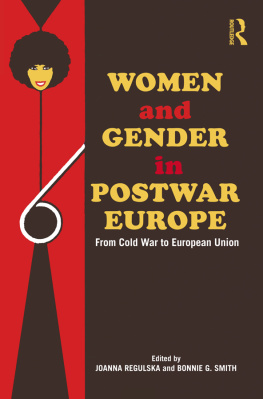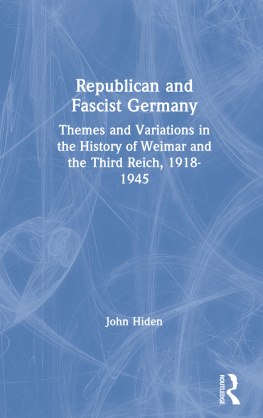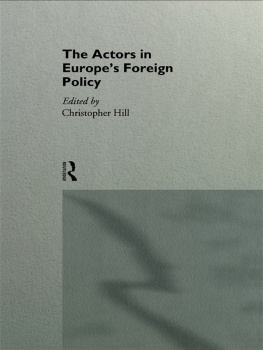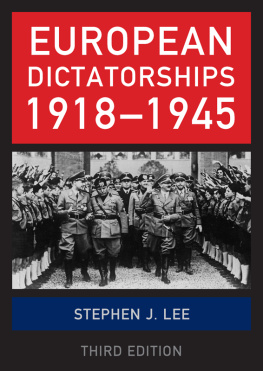Europes Postwar Periods 1989, 1945, 1918
Europes Postwar Periods 1989, 1945, 1918
Writing History Backwards
Edited by
Martin Conway, Pieter Lagrou and Henry Rousso
Contents
This book is the outcome of a series of workshops organized by the European Network on Contemporary History (EURHISTXX), created in 2007 and benefitting from funding by the French Centre national de la Recherche scientifique (CNRS) as a Groupe de recherche europen. The network was formed in a specific intellectual and political context. A decade after the fall of the Berlin Wall, academics from the eastern and western parts of Europe were still searching for the means to create a common basis which would unite the historical discipline. Contemporary history, as a sub-discipline, was also facing significant additional challenges. The end of the twentieth century and the beginning of the twenty-first century were characterized by intense battles over the memory of the recent past, and the European continent remained divided into different historical traditions, separated by the legacies of the two world wars, the Holocaust, the Cold War, decolonization, and above all the experience of communism. In this context, while historians were and still are constrained by ever-increasing social and political demands, there was an urgent necessity to launch a transnational reflection on how to write about the recent past.
The network brought together a group of historians belonging to research institutions and universities all over Europe who were preoccupied with the legacy of traumatic events, the presence of the past, the social role of historians and their transformation into experts, including those in the legal sphere. Most of them had been involved in the previous years, in major national or international debates over history and memory. The network, coordinated by Henry Rousso at the Institut dhistoire du temps prsent (CNRS) in Paris, included scholars based in Amsterdam, Bologna, Brussels, Budapest, Dublin, Edinburgh, Jena, Oxford, Paris, Potsdam, Vienna and Warsaw.
Even before the formal constitution of EURHISTXX, the partners in the project had engaged in extensive discussions about the challenges facing the writing of European contemporary history, in the framework of an ultimately unsuccessful application for the 6th European Framework Programme of the European Commission for Research. As part of a larger network, EURHIST initiated by the cole logical view of the history of Europe.
Last but not least, when the group decided, thanks to John Hornes intuition, to raise the question of the three postwar periods including the postCold War period within a long-term perspective, it adopted not only a regressive method as explained in Martin Conways introduction, but also a reflexive perspective: the research itself, the institutions where it was based, the historians and the social scientists who drove it are fully part of the analysis.
Henry Rousso
Notes
Amsterdam, the School of Histories and Humanities at Trinity College Dublin, the Zentrum fr Zeithistorische Forschung in Potsdam
Pter Apor is a research fellow at the Research Centre for the Humanities, Hungarian Academy of Sciences.
Paolo Capuzzo is professor of contemporary history and director of the Department of History and Cultures at the University of Bologna.
Martin Conway is professor of contemporary European history at the University of Oxford and a fellow of Balliol College, Oxford.
John Horne is a historian, emeritus professor of European history at Trinity College, Dublin, and a member of the Royal Irish Academy.
Pieter Lagrou is professor of contemporary history at the Universit Libre de Bruxelles.
Guillaume Mouralis is a historian, researcher at the Centre national de la recherche scientifique and a fellow of the Centre Marc Bloch in Berlin.
Malika Rahal is a historian, researcher at the Centre national de la recherche scientifique and a fellow of the Institut dhistoire du temps prsent in Paris.
Henry Rousso is a historian, senior researcher at the Centre national de la recherche scientifique and a fellow of the Institut dhistoire du temps prsent in Paris.
Dariusz Stola is professor of history at the Institute of Political Studies, Polish Academy of Sciences, and director of the Polin Museum of the History of Polish Jews.
Annette Weinke is assistant professor of history at the Friedrich Schiller University of Jena and co-director of the Jena Center 20th Century History.
Martin Conway
Historians always have an ambiguous relationship with the present. The present is the land we inhabit, but not that in which we were born and were formed; similarly, the present is the vantage point from which we view the past but which we seek rather deliberately to exclude from our perception of that past. Nothing, as books of historical methodology never tire of repeating, is as bad as writing history from the perspective of the present, imposing anachronistic forms of identity onto the people of the past, or constructing facile teleological narratives which interpret the past as a road leading, for better or for worse, towards the present day.
Yet, the present is of course always with us. Whatever our resolve to escape from present-minded concepts and narratives, historians cannot avoid the world in which we do our work. This poses problems that we can perceive and denounce in the writings of historians of past generations, but do not always confront in ourselves. This has perhaps been especially so for historians of twentieth-century Europe since the events of 1989. We live in a different Europe one that is larger and more unified, at least in its political structures, but also more global and less self-sufficient in its society and economy than before 1989; yet we persist for the most part in devoting our energies to the study of the history of twentieth-century Europe as if the era since the fall of the Berlin Wall forms part of a separate story. Indeed, the scale of the changes which took place in Europe, east and west, over the decade following 1989, seems to provide a rationale to ignore the shadow of the present. If the present is indeed so different, it leaves us free to study the past simply as the past, liberated from the way in which, prior to 1989, the major milestones of the twentieth century be they the Russian Revolution, the
However, as Furet and Hobsbawm, were strongly marked and enriched by their engagement with the present; and yet the nature of the historical profession and in particular its corporate ethos have encouraged in recent years an inward-turning mentality, which asserts the autonomy of the past in order to block out the noise of the present.
This book is therefore the fruit of a collective endeavour on the part of a group of historians of twentieth-century Europe to bring the post-1989 present into our past. In that respect, the collective biography of the authors of this volume is in itself significant. We are drawn from different regions and states of Europe, both east and west, and we encompass a range of ethnicities, languages and political mentalities. But we are also, almost all, male, and white, and all operate within a professional historical world, and its institutions of universities and research institutes. We come from different generations, but we are also all historians whose personal roots lie in the pre-1989 world, for whom the post-1989 reality of Europe constitutes the world around us, but remains different from the world we remember.








